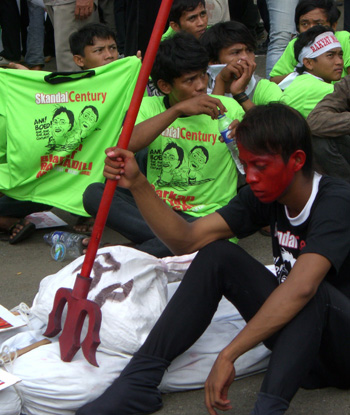Corruption continues to dominate discussion but is a different beast to what it once was
Elisabeth Kramer and Michele Ford
 |
Activists protest the Bank Century corruption scandal at the International Anti-Corruption Day rallyElisabeth Kramer |
Discussions about corruption are nothing new in Indonesia. Over the decades since independence Indonesia has developed a global reputation for corrupt practices that shows no sign of diminishing. Currently, the issue is so pervasive that it is impossible to avoid. Knowledge of cases and figures embroiled in corruption scandals become part of your consciousness, whether or not you make an effort to seek out information about them. And while particular cases come and go, the theme of corruption continues to dominate discussion of current events in Indonesia.
There is a general acknowledgment that corruption permeates both public and private spheres. To get bureaucratic tasks done promptly has long required an informal payment of some sort. To get anything done in the parliament appears to be no different, with ‘envelope’ politics a common phenomenon. While anti-corruption initiatives such as the establishment of the Corruption Eradication Commission (KPK) and various projects by civil society groups attempt to change the status quo, the reach of corruption seems undeniable, even if it has now taken on new forms.
Ask any Indonesian on the street and you will find that this is common knowledge. So in this edition of Inside Indonesia, we set out to find some more











